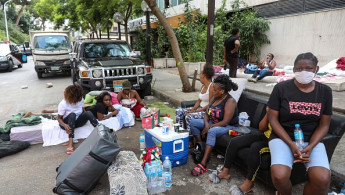Kenyan activist threatened with deportation from Lebanon
Lebanon is threatening to deport a Kenyan activist and asylum seeker at risk of persecution in her home country, a local migrant rights group has said.
The activist was taken to the airport for deportation to Kenya on 4 August by Lebanese General Security, but the deportation attempt was stopped by bystanders and activists, local NGO Anti-Racism Movement (ARM) told The New Arab.
The woman, named by ARM as NM, still remains at risk of being forced to return to Kenya since her deportation order is still in place.
According to ARM, NM has an active case with the UN High Commission for Refugees (UNHCR) to assess her asylum status.
"The Lebanese authorities are breaking international laws and norms by bypassing the UNHCR’s legal mandate to forcibly deport a registered asylum seeker," ARM said. They added that NM faces "serious risks from her family and community" if she is returned.
NM works as a migrant domestic worker in Lebanon, and was arrested on 15 April. Despite the charges against her being dismissed, she has been kept in detention since.
ARM has suggested that NM’s initial arrest and detention were motivated by her political activism.
NM is active within the migrant domestic worker community within Lebanon and has taken part in sit-ins to demand assistance from the Kenyan consulate in the past. The consulate has faced multiple allegations of predatory practices, including taking the money of Kenyan domestic workers in Lebanon.
In January, dozens of Kenyan migrant domestic workers held a weeks-long sit-in in front of the consulate demanding repatriation. They alleged the consulate was doing nothing to assist them.
During her detention, NM faced physical violence which resulted in her losing consciousness and breaking her leg, according to ARM. The organisation said that she was also denied access to medical care and medication.
The New Arab contacted the Lebanese General Security spokesperson with questions about NM’s case and deportation, but did not receive an answer by the time of the publication. The Kenyan Consul in Lebanon also refused to comment, saying her case was "confidential".
Lebanon uses the Kafala system to regulate foreign labourers – a system which ties an individual’s residency status to a specific employer. Human rights monitors say that Kafala leaves foreign workers vulnerable to abuse and does not allow them to negotiate the conditions of their employment.
Abuse of foreign domestic workers is frequent in Lebanon and workers rarely receive protection from authorities to secure their rights.
Despite calls for Lebanon to abolish the Kafala system or issue regulations which give migrant workers more rights, the Labour Ministry has made few reforms in recent years.





 Follow the Middle East's top stories in English at The New Arab on Google News
Follow the Middle East's top stories in English at The New Arab on Google News


